Imperialism
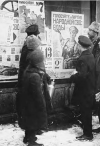
Post-revolutionary societies, in their efforts to combat counterrevolution, have always been confronted with their own contradictions, and with the persistent threat that an exploiting class could reemerge. Instead of the intended socialization and democratization, in many places what resulted was instead state ownership and stultifying bureaucratization of both the economy and the polity. | more…
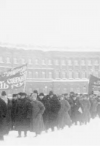
Left Intellectuals in Yugoslavia, 1988–90
Throughout Eastern Europe, there was an unleashing of pent-up questions, hopes, and fears brewing for decades. There was a sense that the ground was trembling underneath these experiments in socialism. It was clear to most of us that socialism could only survive through radical democratization. | more…
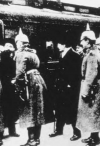
The New York Times, 1917–2017
Mainstream media outlets have recently expressed their dismay over the rise and spread of “fake news,” taking it as an obvious truth that what they themselves provide is straightforward, unbiased, fact-based reporting. They do offer such news, but they also provide a steady flow of false or misleading information, often supplied by the national security state, other branches of government, and sites of corporate power. | more…
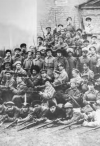
The liberation struggles of peoples in the global South have been and still are closely linked with the challenge to capitalism. Indeed, the conflicts between capitalism and socialism and between North and South are inseparable. No socialism is imaginable outside of universalism, which implies the equality of peoples. | more…

Gaining Independence in 1975, Mozambique’s government proclaimed a progressive approach toward women’s liberation, seeing it as essential for the continued success of the revolution. Stephanie J. Urdang, who traveled often to Mozambique, examines women’s status there ten years later, talking with women in factories and fields, village co-operatives, and state farms. Urdang produces an inspiring yet sobering picture of how African women continued to struggle for their survival and their liberation. Drawing on scholarly research as well as first-hand investigation, And Still They Dance says much about the daily lives of women living in independent Mozambique after the revolution. | more…

The Legacy of Andre Gunder Frank's 'Development of Underdevelopment'
Admired, followed, criticized, denounced, and rediscovered, “The Development of Underdevelopment” deserves a place among the key documents of postwar radical political economy. More than fifty years on, its ideas still illuminate aspects of recent struggles and shortcomings among left-of-center governments in Latin America. Most importantly, Frank’s work poses a bold postcolonial challenge that has yet to be fully met by Latin American scholars and social movements. | more…

Guinea-Bissau, a small country on the West Coast of Africa, had been a colony of Portugal for 500 years, and with the 1926 rise of a Portuguese fascist dictatorship, colonization of the country became both brutal and complete. In 1956, the African Party for the Independence of Guinea and Cape Verde (PAIGC) was founded by Amilcar Cabral and a few country people. At first, PAIGC’s goal was to organize workers in the towns, hoping that through demonstrations and strikes they would convince the Portuguese to negotiate for independence. It soon became clear that this approach to independence would not work. Each demonstration was met with violence, until the 1959 massacre of fifty dockworkers holding a peaceful demonstration at Pidgiguiti. This was a turning point for PAIGC: they realized that independence could not be won without an armed struggle, one that had to be based on the mass participation of the people. This book focuses on the way in which PAIGC ideology integrated the emancipation of women into the total revolution: the way it emphasized the need for women to play an equal political, economic, and social role in both the armed struggle and the construction of a new society. | more…
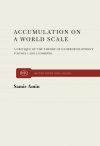
Samir Amin has undertaken an ambitious task: nothing less than an analysis of the process of capital accumulation on a global level. Drawing on a wide range of empirical material from Africa and the Middle East, Amin attempts to demonstrate, through a critique of writings on “underdevelopment,” how accumulation in advanced capitalist countries prevents development, however that may be defined, within the peripheral social formations, usually referred to as “underdeveloped” countries. Samir Amin ranks among those who realize the necessity not merely to comprehend the growing crisis of world capitalism, as it manifests itself within individual nation states, but also at the world level. | more…
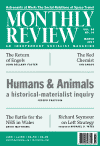
U.S. economic, military, and financial dominance have been ebbing for decades, leaving the United States in the position of a wounded mastodon within the world at large, a threat to all around it. Washington has repeatedly tried with very limited success to reverse this slide in its hegemonic role by means of geopolitical expansion, aimed at increasing its “strategic assets” across the globe. The result has been a constantly expanding theatre of global conflict. | more…
France and the United States
Following the July 14, 2016, massacre in Nice, French President François Hollande once again extended for three months a state of emergency that was to have ended on July 26. An initial, twelve-day state of emergency had been declared after the Paris attacks and extended for three months by a law of November 2015. Still another three-month extension was added and came to an end on May 26, only to be extended for two additional months. Despite the obvious ineffectiveness of such a measure…it has been extended yet again, through January 2017.… This normalization of the “state of exception” has provoked only a muted public reaction. France has thus entered into a permanent state of emergency. This choice is not the result of exceptional events to which the country must respond, but rather expresses an intention to change the political system, as shown by the move to constitutionalize the state of emergency. | more…
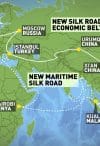
China's Strategy for a New Global Financial Order
In late 2013, Chinese premier Xi Jinping announced a pair of new development and trade initiatives for China and the surrounding region: the “Silk Road Economic Belt” and the “Twenty-First-Century Maritime Silk Road,” together known as One Belt, One Road (OBOR). Along with the Asian Infrastructure Investment Bank (AIIB), the OBOR policies represent an ambitious spatial expansion of Chinese state capitalism, driven by an excess of industrial production capacity, as well as by emerging financial capital interests. The Chinese government has publicly stressed the lessons of the 1930s overcapacity crisis in the West that precipitated the Second World War, and promoted these new initiatives in the name of “peaceful development.” Nevertheless, the turn to OBOR suggests a regional scenario broadly similar to that in Europe between the end of the nineteenth century and the years before the First World War, when strong nations jostled one another for industrial and military dominance. | more…

Or, A Woman Connects Oppressions
Alice Walker is a Pulitzer Prize-winning novelist, poet, and activist. Her most recent book is
The World Will Follow Joy (New Press, 2013). This article was originally a speech delivered at a Peace for Cuba Rally on February 1, 1992, and first published in
MR in June 1994. Walker’s words remain as relevant today as when they were first spoken.










